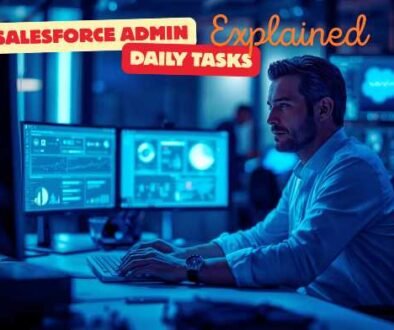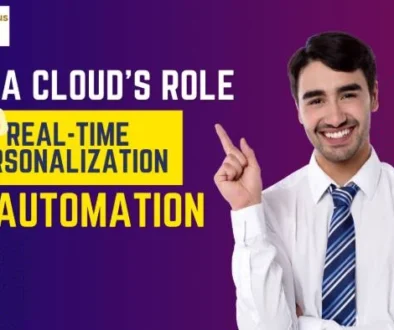Low-Code No-Code Power Users | How Citizen Developers Are Shaping Salesforce?
In the past, building apps or customizing business software required expert developers who could write thousands of lines of code. But today, things have changed. Thanks to low-code and no-code platforms, almost anyone can create applications, automate workflows, and solve business problems—without needing to be a professional programmer.
Salesforce is one of the leading platforms embracing this movement. With its easy-to-use tools like Flow, App Builder, and Lightning Components, Salesforce allows employees outside of IT (often called citizen developers) to build solutions that improve efficiency and deliver value faster.
In this blog, we’ll explore what citizen development is, how low-code/no-code is shaping Salesforce, and why businesses are empowering non-technical users to become “power users.” We’ll also go through step-by-step examples of how a beginner can start building on Salesforce without deep technical knowledge.
Note : – Join Our Salesforce Classes in Pune for Practical Learning
Table of Contents
What is a Citizen Developer?
A citizen developer is a business user who creates apps, automates processes, or customizes software using low-code or no-code tools. They are not full-time developers but have a good understanding of business needs and use simple drag-and-drop tools to solve problems.
For example:
- A sales manager creates an approval workflow for discounts using Salesforce Flow.
- A service agent builds a simple app to track customer complaints without writing code.
- A marketing executive uses App Builder to design a dashboard showing campaign performance.
Citizen developers act as a bridge between IT and business operations. They know the daily challenges teams face and can quickly design solutions.
Why Low-Code/No-Code is Important in Salesforce
Salesforce has always focused on making customization easier. With tools like Flow Builder, App Builder, and Einstein AI, users can now do tasks that earlier required a developer.
Here’s why this is so powerful:
- Speed: Building apps takes days or weeks instead of months.
- Cost Savings: Less dependency on IT or hiring developers for small tasks.
- Empowerment: Business users solve their own problems instead of waiting for IT.
- Innovation: Employees can test new ideas quickly.
- Scalability: Organizations can deliver solutions across teams faster.
This is why citizen developers are becoming key players in the Salesforce ecosystem.
Tools in Salesforce for Citizen Developers
Let’s look at the main low-code/no-code tools in Salesforce that make this possible.
1. Salesforce Flow: Salesforce Flow is a tool that allows users to automate processes without writing code. It’s like a visual drag-and-drop builder where you connect steps in a workflow.
Example: A sales manager wants an automatic approval process:
- If a discount is above 20%, the request goes to a manager for approval.
- If it’s below 20%, it gets auto-approved.
Instead of coding, the manager can set this up in Flow within minutes.
2. App Builder: App Builder lets you create custom applications for Salesforce using a drag-and-drop interface. You can design pages, add components, and build apps tailored to your team.
Example: A service agent creates an app that tracks customer complaints with fields like complaint type, resolution time, and follow-up status. No coding is required—just dragging and dropping fields.
3. Lightning App Pages: Citizen developers can create custom Lightning pages for different users. Each page can show the data most relevant to that role.
Example: A marketing user sees campaign analytics and leads on their dashboard, while a sales rep sees open opportunities and recent customer activity.
4. Reports and Dashboards: Even creating reports and dashboards is part of low-code development. Non-technical users can quickly visualize data, set filters, and create interactive dashboards.
Example:
A marketing manager builds a dashboard showing email open rates, campaign ROI, and lead conversions—all without writing a single line of code.
5. Einstein AI and Automation: With Einstein AI, Salesforce brings intelligence into the hands of non-technical users. Citizen developers can add predictive scoring, smart recommendations, or automated insights into workflows.
Example:
A sales rep uses Einstein to see which leads are most likely to convert, without needing any technical setup.
How Citizen Developers are Shaping Salesforce
Citizen developers are not just using Salesforce—they’re transforming how businesses work. Here’s how:
1. Faster Problem-Solving: Instead of waiting weeks for IT, employees can solve problems immediately. For example, if a sales team needs a new approval process, they can build it themselves.
2. Closing the Gap Between Business and IT: Citizen developers understand daily business needs. By building their own solutions, they ensure IT doesn’t have to guess what’s required. IT can then focus on more complex, high-priority projects.
3. Encouraging Innovation: Because it’s easy to experiment, citizen developers can test new ideas. Some of these ideas turn into solutions that improve the business at scale.
4. Empowering Every Team: Marketing, sales, service, HR, and even finance teams can customize Salesforce for their own needs without relying fully on technical staff.
Note : – Join Our Salesforce Course Online for Practical Learning
Step-by-Step: Becoming a Citizen Developer in Salesforce
If you’re new to Salesforce but want to become a low-code/no-code power user, here’s a simple roadmap:
Step 1: Learn the Basics
- Understand Salesforce objects (like Accounts, Contacts, Leads) and navigation.
Step 2: Explore Reports and Dashboards
- Start by creating custom reports for your team’s needs.
Step 3: Try App Builder
- Experiment with creating a simple app—maybe a task tracker for your team.
Step 4: Learn Salesforce Flow
- Build small automations like sending an email alert when a new lead is added.
Step 5: Work With Templates
- Salesforce provides pre-built templates for apps, pages, and flows. Use them to learn faster.
Step 6: Keep Practicing
- The more you practice, the more confident you’ll become in solving problems with Salesforce tools.
Examples of Citizen Development in Action
- Sales Team: A sales rep creates a lead prioritization flow so that hot leads are automatically highlighted.
- Service Team: A service agent builds a case escalation flow to notify managers when cases stay unresolved for more than 48 hours.
- HR Team: An HR manager designs an app to track employee training sessions.
- Marketing Team: A marketer builds a campaign dashboard to track ROI from different channels.
These examples show that low-code/no-code isn’t just for IT—it’s for everyone.
Benefits for Businesses
- Faster Time to Market: New apps and workflows are launched quickly.
- Cost Savings: Less dependency on hiring developers for every change.
- Employee Empowerment: Teams feel more in control and productive.
- Scalability: Solutions can grow as the business grows.
- Better Collaboration: IT and business teams work together more smoothly.
Conclusion
The rise of low-code/no-code citizen developers is one of the biggest shifts happening in Salesforce today. By giving power to everyday business users, Salesforce makes it possible for anyone to build apps, automate processes, and deliver innovation without waiting on IT.
Citizen developers are shaping the future of Salesforce by creating faster, more efficient, and more personalized solutions. Businesses that encourage this movement are not only saving time and money but also driving innovation from within.
If you want to become a Salesforce citizen developer, the best way is to get hands-on practice with tools like Flow, App Builder, and Einstein. To start your journey, you can join Salesforce training in Pune at Victorious Digital, where you’ll learn step-by-step how to use low-code/no-code tools and build real-world solutions.
The future of Salesforce belongs to both developers and citizen developers—and together, they’re transforming how businesses work.
Also Read – How Does Salesforce Help Companies Streamline Business Operations?




